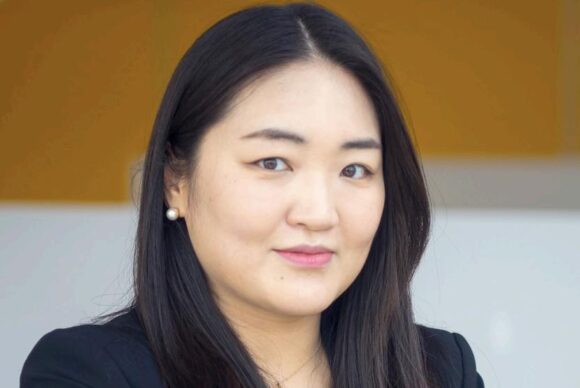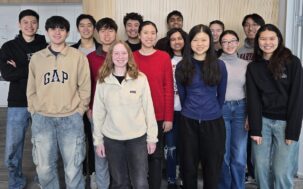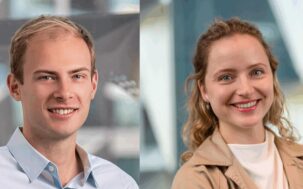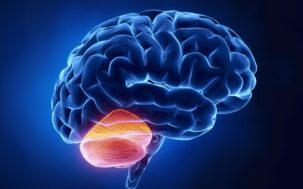Leading Computational Neuroscientist SueYeon Chung to join Harvard’s Kempner Institute and FAS’ Center for Brain Science
New faculty researcher will bring expertise in using AI to understand brain structure and function

SueYeon Chung’s research explores the principles of neural computation in the brain and artificial neural networks (ANNs)
CAMBRIDGE, MA —The Kempner Institute announced today the appointment of SueYeon Chung (PhD ‘17), who returns to Harvard as a Kempner Institute Investigator and faculty member in the Faculty of Arts and Sciences (FAS) Center for Brain Science (CBS). In addition to her appointments within the Kempner Institute and CBS, Chung will hold a faculty position as Assistant Professor of Physics in the FAS with a joint appointment in Applied Mathematics in the Harvard John A. Paulson School of Engineering and Applied Sciences (SEAS).
“Dr. Chung’s work is at the forefront of the rapidly-progressing field of NeuroAI,” said Kempner co-director Bernardo Sabatini. “Her theoretical insights into neural representations in artificial and biological networks have the potential to change the way we think about structure and function of these networks, and have important implications for the work that the Kempner Institute is doing to advance our understanding of the basis of intelligence in natural and artificial systems.”
“We are thrilled to have SueYeon Chung join the CBS and Kempner community,” said Venkatesh Murthy, Paul J. Finnegan Family Director of the Center for Brain Science. “She is a rising star in theoretical and computational neuroscience, combining approaches and insights from statistical physics and machine learning to advance our understanding of natural and artificial intelligence. She will deeply enrich our growing network of collaborative scientists spread across many departments and schools, and will undoubtedly attract the smartest young trainees to our community in this exploding area of research.”
“SueYeon Chung’s appointment marks an exciting collaboration between CBS, Kempner, FAS, and SEAS. Her interdisciplinary work in AI, physics, and applied math provides a new understanding of the computational underpinnings of cognition in brains and artificial networks,” said Kenneth Blum, Executive Director of the Center for Brain Science.
Chung will begin her appointment at Harvard in July 2025.
Research at the intersection of machine learning and neuroscience
Chung’s research explores the principles of neural computation in the brain and artificial neural networks (ANNs). Combining theoretical neuroscience, machine learning, and statistical physics, she investigates how neural systems represent, transform, and compute information. Her work focuses on two key approaches: (1) developing mathematical theories to capture neural representations, with an emphasis on the geometry of neural population activities through neural manifolds, and (2) creating ANN-based models with neurally plausible architectures and biologically-inspired learning rules.
By connecting multiple levels of understanding—from the activity of single neurons to the collective dynamics of neural populations and emergent cognitive functions—Chung’s research reveals the structural principles underlying neural computation. This integrated approach bridges biological and artificial systems while laying a foundation for designing interpretable, efficient, and robust AI systems inspired by the brain’s computational strategies.
At the Kempner Institute, Chung and her team will investigate a variety of topics at the forefront of NeuroAI, including:
- How neural manifolds reveal shared principles and alignment between brains and artificial networks
- How the structures of neural representations adapt to efficiently handle different tasks
- How learning and connections in the brain shape the flow of information within and across brain regions
- How brain-inspired mechanisms enhance the reliability and robustness of AI models
- How methods from neuroscience and physics can help interpret AI systems
Chung is currently an Assistant Professor of Neural Science at New York University, and project leader at the Center for Computational Neuroscience, Flatiron Institute, Simons Foundation. She is also part of the CILVR (Computational Intelligence, Learning, Vision, and Robotics) Group, and an affiliated faculty member at the Center for Data Science, and the Cognition & Perception program at NYU. Before joining NYU/Flatiron, she was a postdoctoral researcher in the Center for Theoretical Neuroscience at Columbia University, where she was advised by Larry F. Abbott. Prior to that, she was a fellow in computation in the Department of Brain and Cognitive Sciences at Massachusetts Institute of Technology, where she worked with Jim DiCarlo and Josh McDermott. Chung received a Ph.D. in applied physics at Harvard, where she was supervised by Haim Sompolinsky and co-advised by Ryan P. Adams. She studied physics and mathematics as an undergraduate at Cornell University.
Chung was selected as a 2024 Sloan Research Fellow by the Alfred P. Sloan Foundation and earned a 2023 Klingenstein-Simons Fellowship Award in Neuroscience. Her work is also supported by a BRAIN Initiative R01 Award from the National Institutes of Health.
About the Kempner Institute
The Kempner Institute seeks to understand the basis of intelligence in natural and artificial systems by recruiting and training the next generation of researchers to study intelligence from biological, cognitive, engineering, and computational perspectives. Its guiding principle is that natural and artificial forms of intelligence share important characteristics. Future innovations in artificial intelligence (AI) will take inspiration from the principles that our brains use for fast, flexible natural reasoning. In parallel, theories developed for AI will enhance our understanding of how our brains compute and reason. Join the Kempner mailing list to learn more, and to receive updates and news.
PRESS CONTACT:
Deborah Apsel Lang | (617) 495-7993 | kempnercommunications@harvard.edu






